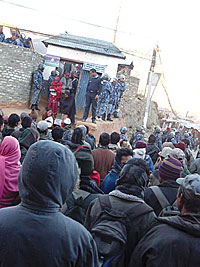 |
JUMLA - The subsidies provided by the government and NGOS on both rice and vegetables in the Karnali is increasing dependency and prompting a fall in food production in all five districts of the zone.
Many NGOs have been giving five to eight kilos of rice in exchange for non-agricultural work like road construction and building schools, thereby reducing the input into agriculture by the Karnali inhabitants.
The increasing quotas from donor food organisations are having a negative impact on the agricultural sector. The NGOs supply of 'cheap rice' means production of wheat, rye and buckwheat has dropped. In 2005/2006 over 2,800 hectares were cultivated for crops but by 2007/08 it had fallen by 200 hectares. These organisations have been distributing beans also in Humla - just 30 years ago lentil and bean production in the region used to be so high that it was being exported toTibet.
Agricultural Development Program official Dila Ram Bhandari says, "The trend of distributing supplies from outside as soon as there is a crisis, has led to the extinction of local agriculture."
Jumla academic Kusendra Mahat says, "Compensation should only be provided during natural disasters for a certain amount of time. But this ongoing food distribution is now likely to displace agriculture."
Although there was a scarcity of rice, wheat, buckwheat and rye production was still high. The rice shortage was caused because only 15 per cent of arable land was cultivated. Many agricultural experts accuse the government and donors of exaggerating the food crisis.
Right now the government is paying double the cost of producing the rice just for transportation. In the last fiscal year, it paid Rs 260 million for transporting the 54,000 quintals of rice to the Karnali when producing it would have cost just Rs 130 million.


